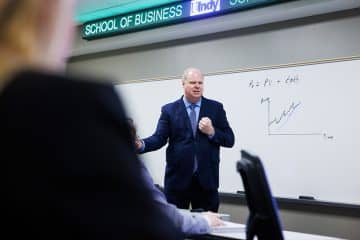Can I Get an MBA Without a Bachelor’s Degree in Business?
Many people pursuing a career in business want to get a Master of Business Administration, or MBA. Getting a master’s degree in business can provide you with better employment opportunities as well as better job security. If you want to advance in your career, getting an MBA might be the perfect choice for you.
It’s a common misconception that you can’t get an MBA unless you have a bachelor’s degree in business or did some kind of business schooling in your undergraduate career. You’re actually more than capable of pursuing an MBA even if you don’t currently have a degree in business.
Keep reading to learn more about getting your MBA and to get insight into the application requirements and processes.
Does Your Bachelor’s Degree Matter When Pursuing an MBA?
It’s true that having business experience may help you get into an MBA program, but you are not required to have an extensive business background to apply. Most schools are more concerned with your skills, real-world experience, comportment, and motivation over prior education. At Adelphi University in New York, healthcare is a major component of the local economy. Adelphi’s Robert B. Willumstad School of Business has many students with backgrounds in clinical healthcare who enroll in the MBA program. Real-world experience is considered when accepting applicants with a healthcare background and no business background is required.
When you apply, use your statement of purpose to emphasize the transferable skills that will help you succeed in an MBA program.
“An MBA helps students, regardless of background, transform and translate the skills and experience they bring into business value,” says Dr. Daniel Hall, Dean of the Phillips School of Business at High Point University. “Show you are already planning for this in your application to be seen as an attractive candidate.”
Looking to change or supercharge your career with skills from an MBA program? What you need is a bachelor’s degree. The type of degree won’t matter, so long as it is from an accredited university. For a university or program to be accredited, it needs to maintain a certain level of educational standards. Accreditation can be issued both to institutions as a whole—like an entire university—or to smaller programs and departments within a larger school. At Adelphi University, the Robert B. Willumstad School of Business is accredited by the Association to Advance Collegiate Schools of Business (AACSB), which is the most recognized form of accreditation that a business school can earn.
Accrediting agencies are in charge of issuing accreditations. The U.S. Department of Education maintains a list of federally-recognized accrediting agencies.
The bottom line is that the kind of bachelor’s degree you have is not as important as having a degree from an accredited university. As long as you have a recognized degree, you can apply to get an MBA. Of course, it will still benefit you to emphasize any business-related knowledge, skills, or experiences in your application.
MBA Application Requirements for Non-Business Applicants
The required application criteria will very depending on the MBA program you apply to. Some common criteria include prerequisites or post-baccalaureate coursework, scores from standardized tests, and skill assessments.
Post-baccalaureate programs and degrees (also called a post-bacc) are intended to help people who already have a degree get more experience in a different field. Many people who want to change careers or get a higher education degree in a different subject than their original field pursue a post-bacc to prepare. Business schools, medical schools, and computer science programs are all well known for post-baccalaureate programs.
You may need to complete some prerequisite coursework before applying to an MBA program. Some of these courses might include mathematics, statistics, economics, finance, and more. Depending on the institution and program you apply to, you may also need to take a standardized test, such as the GRE or the GMAT.
The GMAT measures things like:
- Writing and critical thinking skills.
- Integrated reasoning and real-world problem analysis.
- Data literacy and quantitative problem solving.
- Verbal skills, reading comprehension, and critical reasoning.
Be sure to double-check which standardized test you should sign up for, or whether you need to take one at all.
Some programs also require at least one year of business-related work experience or a demonstration of certain skills. For example, Adelphi’s Robert B. Willumstad School of Business requires four years of managerial experience for its Professional Accelerated MBA. Check with your institution to see if there are any unique requirements.
Why Get an MBA if You Don’t Have a Bachelor’s in Business?
An MBA is a great graduate-level degree for anyone who wants a broader business skill set. Getting an MBA can dramatically increase your earning power, too; in 2021, people with MBAs received a starting salary 22-40% higher than people who only had an undergraduate degree.
Do you want to transform the direction of your career or give yourself more opportunities for advancement in your current organization? If so, you’ll benefit from the skills and knowledge offered in an MBA, even if you aren’t working in a “business” field like economics, finance, or supply chain management. Getting an MBA can give you an advantage when applying to management or other leadership positions.
Here are some examples of business-related positions that you could occupy with an MBA:
- Operations Manager
- Data Analyst
- Project Manager
- Human Resources Manager
- Marketing Manager
- Consultant
- CFO
- IT Director
- Sales Director
- Entrepreneur
- Team Manager
Many scientists in administrative positions can also benefit from receiving their MBA, as it can help them manage the more bureaucratic side of science in academia.
Conclusion
There are many good reasons for someone to pursue a master’s degree in business and, luckily, you aren’t required to have a bachelor’s degree in business to do so. If you want to apply to an MBA program but you don’t have a lot of business knowledge from your time in undergrad, there are other ways to make a strong application.
Start by considering the skills and real-world experiences you have that are applicable to a business setting. You can accentuate these details as you write your personal statement and fill out your applications. With no business degree, you’ll also want to look closely at your preferred institutions’ application requirements to see if you need to take some prerequisite courses before applying.
You may need to take a standardized test as well. Outside of these more black-and-white requirements, remember that highlighting any work experience you have in the business world will be beneficial to the success of your application.Looking for more advice as you prepare for your MBA? Check out Abound: MBA’s Advice section for more valuable tips!





